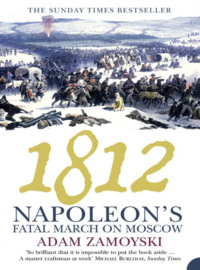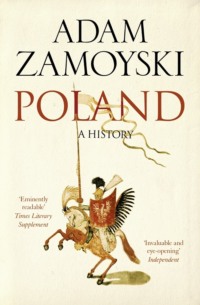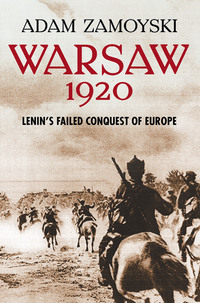
Полная версия
Rites of Peace: The Fall of Napoleon and the Congress of Vienna
While there were many who resented this French stranglehold, others either welcomed or at least accepted it. The only open challenge Napoleon faced was from Britain, but while she was supreme on the seas, her only foothold on the Continent was in Spain, where General Wellington’s army was operating alongside Spanish regular and guerrilla forces opposed to the rule of Napoleon’s brother Joseph. But Britain was also engaged in a difficult and costly war with the United States of America, which restricted her military potential.
The disasters of the Russian campaign had changed all this, but not as profoundly as one might think. Although he was now at war with Russia and had lost an army trying to cow her into submission, Napoleon’s overall position had not altered. His system and his alliances were still in place, and the situation in Spain had actually improved, with the setbacks of the summer reversed and the British and Spanish forces under Wellington repulsed.
The only possible threat to his system at this stage could come from Germany, whose many rulers, beginning with Frederick William of Prussia, found his alliance increasingly onerous, and whose people burned with resentment of their French allies. But Prussia had been reduced to a minor power and bled economically by France over the past few years, while the other monarchs were too weak and too mistrustful of each other to present a credible challenge, and Austria was in no position to make war after her crushing defeat in 1809. Any who still dreamt of throwing off the French hegemony had to take into account the remains of the Grande Armée in Poland and a string of French garrisons in fortresses across Germany.
Napoleon’s self-confidence had not been seriously shaken by the events of 1812. He had blundered politically and militarily, and he had lost a fine army. But he knew – and so, despite the Russian propaganda, did most of the experienced commanders of Europe – that he had been victorious in battle throughout. ‘My losses are substantial, but the enemy can take no credit for them,’ as he put it in a letter to the King of Denmark. And he could always raise a new army.4
France was still the most powerful state on the Continent. Russia had no comparable reserves of power or wealth, and had suffered greatly from the devastations of war in the previous year. With the benefit of hindsight Napoleon’s reputation and the basis of his power had been damaged beyond repair, but at the time it was clear to all that his position remained unassailable as long as he kept his nerve and consolidated his resources. And that is what he set about doing.
At Warsaw, on his way back to Paris, he had stopped just long enough to assure the Polish ministers that the situation was under control and that he would be back in the spring with a new army. At Dresden a few days later, he reassured his ally the King of Saxony and urged him to raise more troops. From there he also wrote to his father-in-law, the Emperor of Austria, saying that everything was under control and asking him to double the contingent of Austrian troops operating alongside the Grande Armée to 60,000. He also asked him to send an ambassador to Paris, so that they might communicate more easily.5
On his return to Paris he set to work at rebuilding his forces. Before leaving he had given orders for the call-up of the age group which should have been liable to conscription in 1814, and this had yielded 140,000 young men who were already being put through their paces in depots. He also had at his disposal 100,000 men of the National Guard which he had set up as a home defence force before leaving for Russia. Mindful of the political situation in France, he now created a new force, the Gardes d’Honneur, made up from the young scions of aristocratic families and those opposed to his rule, drawn from the depths of the most royalist provinces. The improved situation in Spain allowed him to withdraw four Guard regiments, the mounted gendarmerie and some Polish cavalry from the peninsula. And he instructed his other allies in Germany to raise more troops to support him.

Europe at the end of 1812
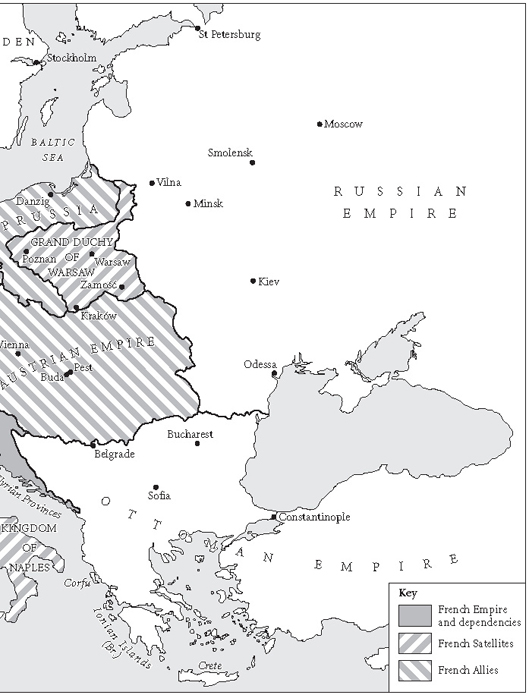
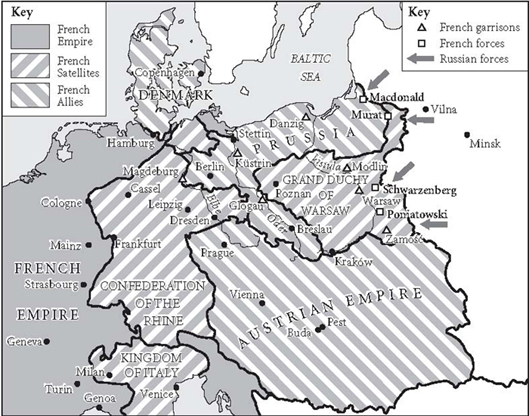
Central Europe at the beginning of 1813
According to his calculations he still had 150,000 men holding the eastern wall of his imperium, with at least 60,000 under Murat at Vilna, 25,000 under Macdonald to the north, 30,000 Austrian allies to the south under Schwarzenberg, Poniatowski’s Polish corps and the remainder of the Saxon contingent under Reynier covering Warsaw, and over 25,000 men in reserve depots or fortresses from Danzig (Gdansk) on the Baltic down to Zamosc. He was therefore confident that he would be able to take the field in Germany with some 350,000 men in the spring.6
But less than a week after his return to Paris, on Christmas Eve, bad news came in from Lithuania. As the remnants of the Grande Armée straggled into what they thought was the safe haven of Vilna, the men’s endurance had given way to the need for rest. Murat had failed to organise an adequate defence, and the advancing Russians were able to overrun the city with ease. The confusion and panic had prevented an orderly evacuation even by those units still capable of action, and a couple of days later not many more than 10,000 men crossed the river Niemen out of Russia. Napoleon was devastated by the news. He bitterly regretted having left Murat in charge, and dreaded the propaganda value of the event. But within a day or two he put it behind him, assuring Caulaincourt that it was an unimportant setback.7
He was certainly not going to allow it to alter his plans or dent his confidence. The requested ambassador of Emperor Francis of Austria had arrived in Paris. He was General Count Ferdinand Bubna, a distinguished soldier whom Napoleon knew well and liked. In the course of their first interview, on the evening of 31 December, Bubna delivered an offer on the part of Austria to help negotiate a peace between France and Russia. Napoleon dismissed it.
He certainly wanted peace, probably more fervently than any of his enemies. He was forty-three years old. ‘I am growing heavy and too fat not to like rest, not to need it, not to regard the displacements and activity demanded by war as a great fatigue,’ he confessed to Caulaincourt. His only reason for making war on Russia in 1812 had been to oblige Tsar Alexander to enforce a blockade that he believed would bring Britain to the negotiating table.8
With nothing better to do during their long drive from Lithuania to Paris, Napoleon had delivered himself, copiously and unstoppably, of his thoughts, occasionally pinching the cheek or pulling the ear of his travelling companion, as was his wont. Fortunately for posterity, Caulaincourt listened carefully and jotted down these ramblings whenever the Emperor fell into a doze or they stopped to change horses. Napoleon again and again asserted that he longed only for peace and stability in Europe, and that the other Continental powers were blind not to see that their real enemy was Britain, with her monopoly on maritime power and trade. Any peace that did not include Britain was of no value, and Britain was not prepared to envisage a peace on terms acceptable to France. She needed to be forced into compromise.
Three days after dismissing the Austrian offer of mediation Napoleon held a conference with his senior advisers on foreign affairs. The main question discussed was whether it would be better to try to strike a deal directly with Russia, over the heads and possibly at the expense of Austria and Prussia, or to bank on Austria as the principal ally and potential negotiator. The Arch-Chancellor Cambacérès, the former Foreign Minister Talleyrand and Caulaincourt advised the first course of action, the actual Foreign Minister Maret and the others opted for the second. As usual during such conferences, Napoleon listened without committing himself to either course. There would be plenty of time to decide, as he did not intend to negotiate from anything but a position of strength. He would be in that position when he reappeared in Germany at the head of a fresh army, and in the meantime he must concentrate on mustering one.9
This was proceeding well. ‘Everything is in motion,’ he wrote to his chief of staff Marshal Berthier on 9 January 1813. ‘There is nothing lacking, neither men, nor money, nor good will.’ The only things that were in short supply, he admitted, were officers and a backbone of tried soldiers, but he was confident he would find these among the remains of the Grande Armée, since it was officers and NCOs who generally made up the majority of the survivors. But that very evening, as he returned from a performance at the Théâtre Français, he received an unwelcome piece of news and one with alarming implications.10
Prussia had been forced into alliance with France and had contributed an army corps to the invasion of Russia. But popular resentment of France was strong, particularly in northern and eastern parts of the country. It was also strong in the army. On 30 December 1812 General Yorck von Wartemburg, commander of the Prussian corps in the Grande Armée, detached it from the French units and effectively signed his own alliance with Russia. As well as making it impossible to hold the line of defence the French had taken up, forcing them to fall back to the Vistula, this development also raised questions about Prussia’s loyalty.
Following fast on this news came the assurance that the King of Prussia, Frederick William III, had denounced the move and issued orders dismissing Yorck from his command. Napoleon’s ambassador in Berlin, the comte de Saint-Marsan, sent reassuring reports of Prussia’s loyalty, and on 12 January the news that Frederick William was entertaining the thought of marrying his son the Crown Prince to a princess of the Bonaparte family to cement the alliance between the two courts. A few days later, Frederick William’s special envoy Prince Hatzfeldt arrived in Paris.11
Napoleon was receiving similarly encouraging reports from Vienna. He did not for a moment doubt that his father-in-law the Emperor Francis would stand by him to the end: he was so besotted by his wife Marie-Louise and his son the King of Rome that he assumed Francis must share those feelings for his daughter and grandson. But Francis did not make policy on his own. ‘Our alliance with France is so necessary that if you were to break it off today, we would propose to re-establish it tomorrow on the very same conditions,’ the Austrian Foreign Minister Metternich had told Napoleon’s ambassador in Vienna, Count Otto. Napoleon nevertheless remained on his guard, and decided to replace Otto with someone who could take a fresh look at the situation in Vienna. For this role he chose the comte de Narbonne.12
While his recruits were being uniformed and trained, Napoleon attended to the everyday business of government, and relaxed by going hunting at Fontainebleau. He took the opportunity to visit Pope Pius VII, who had been living there as his prisoner following the French occupation of the Papal States in 1809. After some brisk bargaining, Napoleon signed a new concordat with him. This was expedient, as his treatment of the Pope had needlessly antagonised Catholics not only in France, but in the domains of his south German and Austrian allies. But the terms of the agreement were so humiliating that they failed to placate them.
On 14 February he attended the opening of the Legislative Assembly, and made a speech in which he announced that he ardently desired peace. He would do everything to further it, but warned that he would never sign a treaty that would dishonour France. He painted a reassuring picture of the state of international affairs, declaring that the Bonaparte dynasty was secure in Spain, and that there was nothing to fear from the situation in Germany. ‘I am satisfied with the conduct of all my allies,’ he stated. ‘I will not abandon any of them; I shall defend the integrity of their possessions. The Russians will be forced back into their horrible climate.’13
2 The Saviour of Europe
‘Gentlemen, you have saved not only Russia, you have saved Europe,’ Tsar Alexander had declared to his generals in Vilna on 12 December 1812, shortly after the last French stragglers had left the city. The truth of both assertions is questionable, but it hardly mattered. Thirty-four years old, personable and chivalrous, Alexander was widely perceived as the beau idéal of monarchy. His refusal to be cowed by Napoleon and his stalwart defence of his country had inspired universal respect. Although he was almost entirely German, the curious mix of exoticism and spirituality with which European opinion endowed most things Russian lent him an aura of glamour and righteousness, and he was seen as a champion by all those who believed that Europe needed salvation.1
But while he felt a consuming urge not to disappoint them, he had no clear idea of how that salvation was to be brought about. His intentions were certainly admirable. ‘He wished that all men could help each other like brothers, assisting one another in their mutual needs, and that free commerce could be the underlying bond of society,’ according to a young lady to whom he opened his heart at this crucial moment. But he lacked the necessary conviction and determination. ‘I sometimes want to hit my head against the wall,’ he told her, ‘and if I could honourably change my condition, I would willingly do so, for there is none more difficult than mine, and I have no vocation for the throne.’2
There was much truth in this. Although kind and generous by temperament, Alexander was quick to take umbrage. Being both weak in character and stubborn, he was easy to influence but difficult to manage. The progressive upbringing to which he had been subjected had destroyed his self-confidence, while his education had been entirely incompatible with his predicament as absolute monarch of the most theocratic and traditionalist power in Europe. They had left him pathetically eager to please, yet determined to prove himself a strong ruler.
‘He would willingly have consented to make everyone free, as long as everyone willingly did what he wanted,’ in the words of a close friend. He was in thrall to the ideals of the Enlightenment, and liked to project an image of himself as a benefactor of mankind, a tendency that developed with time into a sense of spiritual destiny which would take him very far from those ideals. ‘More than ever,’ he wrote to his friend Aleksandr Galitzine in January 1813, as he contemplated the salvation of Europe, ‘I resign myself to the will of God and submit blindly to His decrees.’3
Alexander had ascended the Russian throne in 1801 at the age of twenty-three, following the assassination of his father Paul I, an event in which he had been heavily implicated. He had promptly set up a ‘Secret Committee’ of close friends who thought like him to assist him in planning the fundamental reform of the Russian state. The one singled out to consider foreign policy was Prince Adam Czartoryski, who funnelled Alexander’s utopian urges into a grand project for a future ‘system’ to govern all international relations.
In common with a number of other European statesmen, Czartoryski believed that the old system of diplomacy, involving a neverending pursuit of parity based on achieving a necessarily elusive balance of power, was pointless as well as morally unacceptable. He came up with a blueprint for a supranational security system based on federations of smaller states, grouped according to linguistic or cultural affinities, which would lack both the desire for conquest and the cohesion to make war effectively except in self-defence. Alexander was greatly taken with this vision, which appeared to justify a deeply rooted Russian aspiration to extend dominion over all lands inhabited by Slavs.4
Neither Alexander nor his advisers saw expansion into Europe as being Russia’s destiny – that lay in Constantinople and the east. But Russia’s meteoric emergence as a major power over the past hundred years impelled her to take an interest in Europe, if only out of an instinct for self-defence. The powers that needed to be watched were, in the first place, Britain, whose maritime supremacy and eastern dominions were thought to constitute an obvious challenge; France, whose traditional alliance with Ottoman Turkey and interest in Egypt and points further east were a source of unease; and, to a lesser degree, Austria, whose possessions in the Balkans were at the very least an inconvenience. In the 1790s Russia had been drawn into war with France, but it was a conflict in which she had no actual interests at stake beyond the forlorn hope of establishing a maritime base in the western Mediterranean.
Alexander’s attitude to Napoleon was an ambiguous one. He could not help admiring his talents and energy, and envied the First Consul’s achievements as an efficient modern ruler who had put into effect many of the ideals of the Enlightenment. But he was outraged by his arbitrary brutality, and his distaste for the upstart Frenchman turned to disgust when Napoleon had himself crowned Emperor of the French in December 1804.
In October of that year, as Britain and other powers had contemplated the possibility of war with France, Alexander sent Nikolai Novosiltsov to London with a proposal drawn up by Czartoryski containing his vision of a new order in Europe based on liberal principles and ‘the sacred rights of humanity’. The British Prime Minister William Pitt was predictably sceptical, but responded with eagerness. He praised Alexander’s ‘wise, dignified and generous policy’, and singled out three of the points as the main aims of the proposed coalition against France: that France should be stripped of her conquests and reduced to her former limits; that those recovered territories should be safeguarded in such a way that they should never fall to French aggression again; and, most significantly, ‘To form, at the restoration of peace, a general agreement and Guarantee for the mutual protection and security of different Powers, and for re-establishing a general system of public law in Europe.’5
Nothing came of it, as the coalition which was to usher in this new age was shattered on the fields of Austerlitz, Jena and Friedland. Czartoryski was, reluctantly, dismissed by Alexander in 1806. Taciturn and reserved, he had few friends at court, and was the object of resentment and jealousy on account of his ascendancy over the Tsar. Also, he was a Pole. He had fought against Russia in 1792 in defence of his country, and he had arrived in St Petersburg as a hostage for the good behaviour of his family.
The kingdom of Poland had been wiped off the map in 1795 as a result of a series of agreements between Russia, Prussia and Austria. As well as taking the lion’s share of its territory, Alexander’s grandmother Catherine the Great had been the prime mover. In common with most enlightened opinion, Alexander condemned this partition of one of the ancient states of Europe, and he also felt a degree of personal guilt. These feelings were intensified by his friendship with Czartoryski, to whom he had vowed that he would restore Poland to freedom when he came to the throne. When the time came he was faced by the impossibility of doing anything quite so contrary to what were perceived as paramount Russian interests. But he never ceased to dream of one day redeeming those vows. This Polish conundrum epitomised the conflict in Alexander’s mind between his own ideals and Russian reasons of state, which clashed on many different planes.
Like many Polish patriots, Czartoryski realised that there was no possibility of his country recovering independence in the short term. The best he could hope for was the reunification of its severed portions. He had a vision of Poland as a more or less autonomous province of, possibly even a kingdom within, the Russian Empire, and he served that empire in good faith. But he would never dissipate the suspicions of the court and Russian society in general, which saw in him only a potential enemy. The situation was made no easier by the fact that he had been the lover of Alexander’s wife Elizabeth, who had had a child by him. He was a liability and he had to go.
Czartoryski’s fall from grace did not affect Alexander’s views on international affairs. Nor did it, as the dismissed minister’s patriotic Russian opponents had hoped, do away with what they saw as the Tsar’s lamentable obsession with Poland.
But it did affect Alexander’s attitude to Britain. Czartoryski considered the British to be unreliable and selfish, but nevertheless a necessary ally in the struggle against France. Alexander had his doubts. He was particularly irked by Britain’s insistence on the absolute and exclusive nature of what she termed her ‘maritime rights’, effectively to search every ship at will and to invigilate the high seas. He had accepted her as a necessary ally in 1804, but felt grievously let down in the winter of 1806–07, when he was left alone fighting Napoleon by Britain’s failure to support him by sending an expeditionary force into the Baltic.
Faced with the necessity to treat with Napoleon, Alexander not only made peace: he offered the French Emperor a partnership of the kind he had offered Pitt three years before. He fancied that the resulting alliance, sealed during their meetings at Tilsit in the summer of 1807, would permit him to regenerate his empire and add to it by incorporating Constantinople and other parts of the near east while exerting, in partnership with Napoleon, an enlightened and beneficent tutelage over the continent they dominated.
The débâcle of Austerlitz in December 1805, where Alexander had hoped to shine as a military hero only to have to flee the battlefield as his army disintegrated, and his final defeat at Friedland the following year had been personal humiliations. They had also weakened his position in political terms. While he was still widely loved by his people, they suspected him of weakness and feared his reformist tendencies. Ministers such as Czartoryski and the reforming Speransky were seen as conduits of French/Masonic/Polish/Jewish influence which would corrupt the purity of Russia, and he was obliged to dismiss them as well as to abandon cherished programmes. He found himself at odds with an increasingly eloquent public opinion which he could not ignore. While the Tsar of Russia was theoretically an autocrat with no limits on his power, the overwhelming majority of educated Russians concentrated in the army, the administration, at court, in St Petersburg or in Moscow represented the sole agency through which the state could function, and without its good will the autocrat was literally powerless.6
While it proved uncomfortable and humiliating in many ways, Alexander’s alliance with Napoleon between 1807 and 1812 had allowed him to invade and annex Finland and to acquire a couple of additional slices of Polish territory. He hoped to appropriate yet more, and to move into the Balkans. But none of this was enough. Russia’s self-respect demanded that he adopt a more defiant and even provocative policy towards France. This had led inexorably to Napoleon’s ill-conceived invasion, and as the Russian army followed the defeated remnants of the Grande Armée out of Russia in the last days of 1812, it was clear to all but the most naïve that Russian rule would be extended further west. The grand duchy of Warsaw was there for the taking, giving Alexander the opportunity to pay his debt of guilt towards the Poles by resurrecting the kingdom of Poland.
The establishment of an independent Polish state would preclude Russia making any territorial gains in the west. Worse, it would probably lead to her having to give back Polish provinces she had seized in the past. Alexander could therefore only contemplate establishing a Polish kingdom within the framework of the Russian Empire, with himself as King. This would, he hoped, allay the fears of Russian opinion. But as it would also extend the frontiers of his empire far to the west, it meant that he would have to have a hand in the arrangement of Germany.


